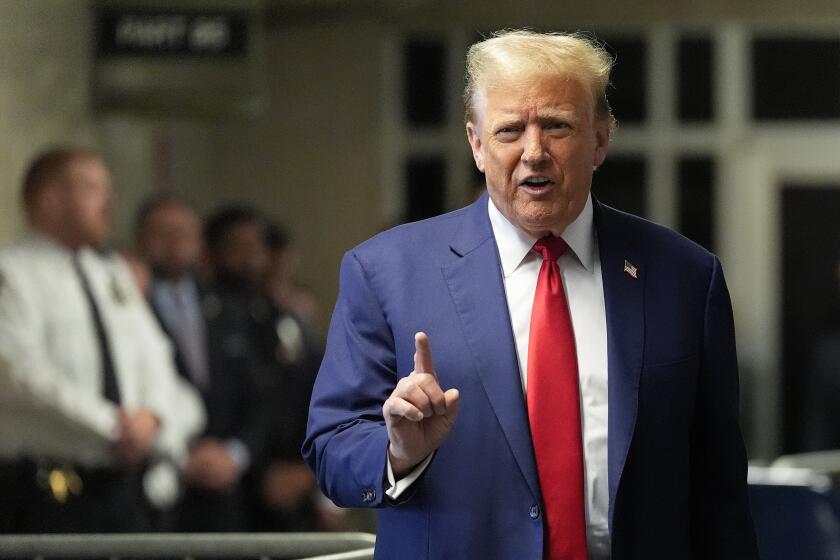In Russian Parliament, Hard-Liners Blink First : Power struggle: Yeltsin wins a murky mandate on his economic reforms as his young team triumphs. The political feuding had put new policies on hold.
As the last act in the Kremlin power struggle played itself out Wednesday, the young, Western-minded members of Russia’s government emerged as the victors and their conservative critics as toothless tigers unable to do much more than growl.
“This has given a very clear sign of who is stronger, who can enlist support when it is necessary and whether opposition forces are ready to take power,” Foreign Trade Minister Pyotr Aven, one of the winners, said happily.
After two days of behind-the-scenes haggling, the Russian Congress of People’s Deputies, whose hard-line members have delivered furious critiques of government “shock therapy” policies, adopted a formal, if somewhat murky, statement of support for the pro-market course being steered by President Boris N. Yeltsin.
The government and Parliament had been at loggerheads since Saturday, when the Congress voted to limit the president’s simultaneous tenure as prime minister to another three months and to revoke his power to rule by decree once a fully fledged government was installed.
Things escalated to a full-blown crisis Monday, when Aven and the other ministers, led by First Deputy Premier Yegor T. Gaidar, tendered their collective resignation and later stormed out of the Parliament hall.
But when matters came to a final crunch, only 203 deputies voted Wednesday afternoon against going on record as “supporting the acts” of Yeltsin and his government.
A total of 578 deputies voted in favor of the declaration, an earlier version of which had been adopted in principle Tuesday, and 64 others abstained.
Yeltsin, who has been inexplicably absent from the Congress since Saturday, acted swiftly after the vote, telephoning Gaidar to express “total support” and refusing to accept the resignation, the Russian news agency Itar-Tass reported.
With the Congress now accepting a share of political blame for the painful social costs incurred by the race to a supply-and-demand economy, Gaidar chaired a 40-minute meeting of his ministers Wednesday evening to order the next round of economic changes, Itar-Tass said, quoting a senior government official.
The government is preparing new measures in credit and tax policy, opening Russia wider to foreign investment, defense, agriculture and social affairs, the news agency said.
Economics Minister Andrei Nechayev, speaking outside the Kremlin hall after the Congress vote, said the government is preparing to phase out taxes on investment, probably starting this summer.
Keeping the 36-year-old Gaidar and his team in office is seen as crucial in economic circles in the United States and other leading Western countries, which recently agreed to bankroll economic reforms here with a package of $24 billion in aid.
After lawmakers voted their show of support, Gaidar bounded to the lectern and extended an olive branch.
“I think we will not arrange a confrontation between legislative and executive powers to befoul the Sixth Congress,” Gaidar said, in what also sounded like a tacit withdrawal of his resignation.
Yeltsin partisans such as jurist Sergei Shakhrai said they hope this session of the Congress will allow them to finally break the back of the remnants of the Communist Party oligarchy, which held nearly uncontested power when the 1,046-member Parliament was elected in early 1990.
Other votes Wednesday on proposed constitutional amendments showed that conservatives still are a force to be contended with, but one of their leaders acknowledged the inability of anti-capitalist forces to mount an effective attack on Gaidar’s team.
“So far the opposition has been incapable of introducing radical changes in the government’s course,” said Vladimir Isakov of the opposition faction known as Unity. “Unfortunately, some deputies want to reach a compromise. Others don’t understand what they are talking about or are keen to avoid conflict.”
Many deputies see the major loser as Parliament Speaker Ruslan Khasbulatov, whose likening of Gaidar and his ministers to capricious children prompted the government walkout.
“Maybe (Khasbulatov’s) extravagant behavior has helped us,” said a prominent reformer, Father Gleb Yakunin of the Russian Orthodox Church. “Conservatives, regardless of their political sympathy, see this behavior is leading to big destabilization, to confrontation.”
Speaking from the dais during the afternoon debate, Khasbulatov endorsed the declaration of “enormous moral support” in Yeltsin’s team. His words aroused shouts from other deputies questioning Khasbulatov’s sincerity.
The declaration does more to keep the government’s and Yeltsin’s powers intact than Tuesday’s document, because it deletes a provision requiring the government to draw up a plan by May 20 to revamp its reforms to take into account the “prevailing economic and social conditions.”
Now, no time limit is imposed. One of Yeltsin’s parliamentary allies, Anatoly Shabad, a Moscow radical democrat, said the language on conditions remains so vague as to allow Gaidar to pursue current policies with a free hand.
By saying nothing about stripping Yeltsin of his decree-making powers or the prime minister’s job, the declaration implies that he can remain head of government until Dec. 1, as originally planned, and retain the decree-making powers in the economic field granted him by the previous Congress.
But under an amendment proposed by Khasbulatov, the declaration also instructs Russia’s leaders to observe the decisions of the Congress, which would include the resolution passed Saturday. That decision, requiring Yeltsin to nominate a new prime minister by mid-July, remains unchanged by the declaration and could serve as a rallying point for the president’s political enemies.
More to Read
Start your day right
Sign up for Essential California for news, features and recommendations from the L.A. Times and beyond in your inbox six days a week.
You may occasionally receive promotional content from the Los Angeles Times.






